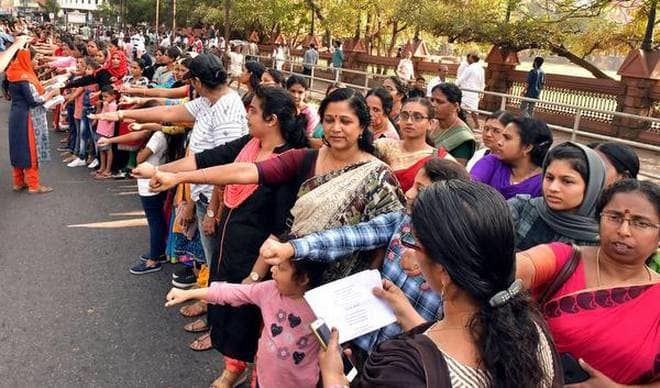The women of India displayed a massive protest against gender inequality on the first day of the new year. They stood together to form a 620 kilometres (385 miles long) chain, the ‘Women’s Wall’, which equates to one seventh times of the Nile river which is the longest river of the world.
The massive rally witnessed a participation of approximately 5 million people (equivalent to the population of Costa Rica) and took place in Kerala, the southern state of India. Various politicians and celebrities attended the rally to express their disagreement with the patriarchal norms of Sabarimala temple, where women of all ages were recently allowed to enter as per the Indian Supreme Court’s judgment.
The event was only lasted for 15 minutes and was expected to see 3 million participants but the massive turnout was a big surprise. It was organized by the ruling party, CPI(M) and included members from more than 176 other socio-political organizations.
State health minister KK Shylaja led the chain at Kasaragod while senior CPM leader Brinda Karat was the last person at the end of the chain in Thiruvananthapuram.
Along with women, men also formed a wall parallel to ‘Women’s Wall’ to show support for the movement and women’s right. It is already hailed as one of the ‘defining’ movements for feminist politics in the country.
All the people in the rally made a pledge which read, “We are taking the pledge that we will uphold Renaissance values, we will stand for equality for women, we resist the attempts to make Kerala a lunatic asylum, and we will fight for secularism.”
How It All Started
The Sabarimala temple is situated in the Attathodu area in Kerala and is a place of worship for the tribal community of the region, which has a custom of restricting women in age group 10 to 50 from entering the temple. Menstruating women are also considered impure and are not allowed to enter the shrine.
The Indian Supreme Court overturned this centuries-old ban citing Article 14 of Indian Constitution that everyone should be equal before the law.
But the local tribal communities and their supporters are still protesting the court decision. They are pelting stones and shouting slogans to drive women away. Even the women police that’s been deployed in the area are facing backlash for doing their duty.
Any women who have tried to get past the mob in order to enter the temple has either had to turn back due to fatigue from fighting off the protestors, has been cut off from the gates from being outnumbered, or had stones thrown to keep them from progressing.
This is not the first time Indian women are facing issues with gender inequality due to customs and century-old laws. But the successful rally demonstrated that women are persistent in changing the norms and building a world where people of all ages, religions, backgrounds, beliefs are treated equally.

